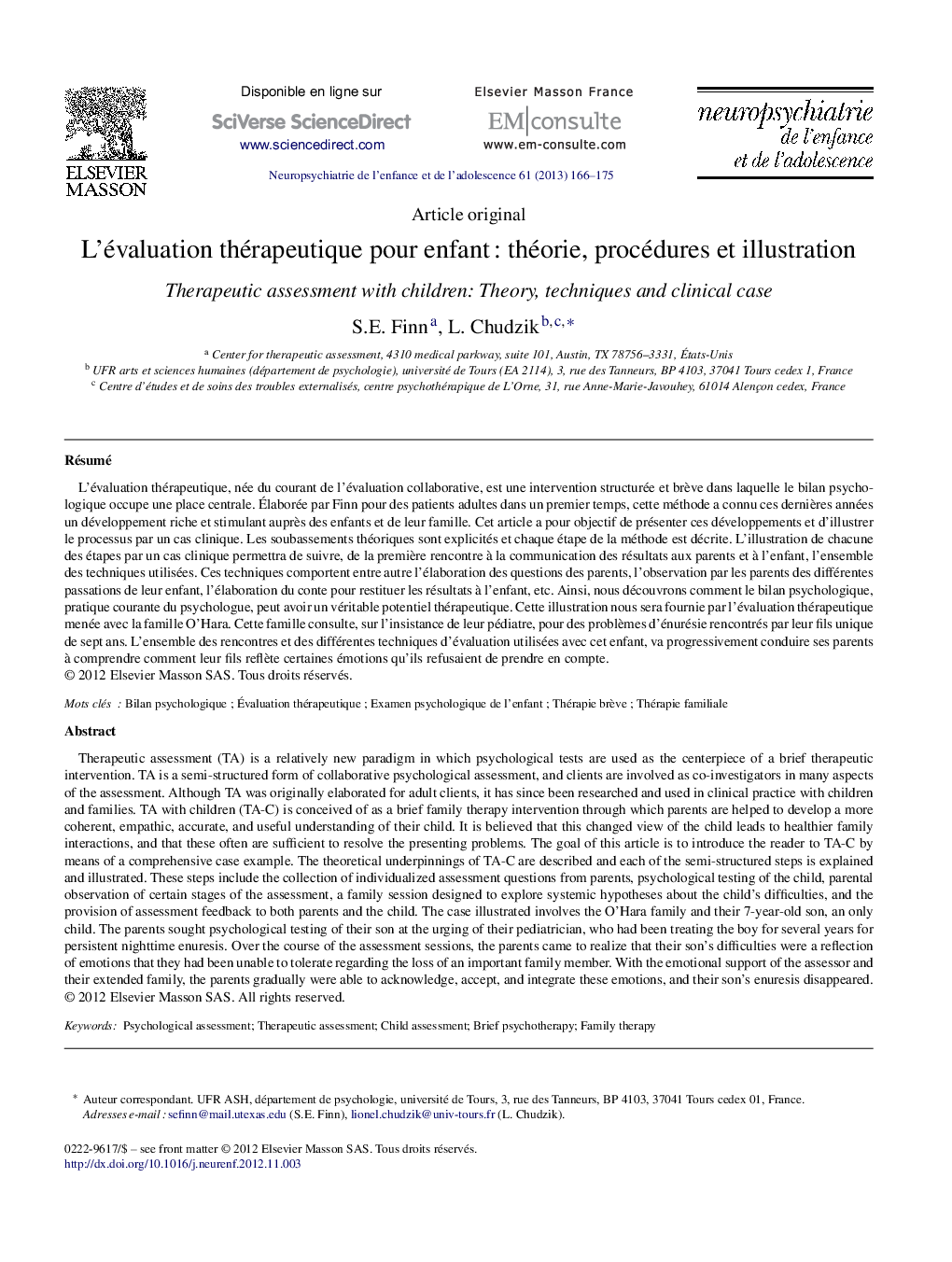| کد مقاله | کد نشریه | سال انتشار | مقاله انگلیسی | نسخه تمام متن |
|---|---|---|---|---|
| 943914 | 925571 | 2013 | 10 صفحه PDF | دانلود رایگان |

RésuméL’évaluation thérapeutique, née du courant de l’évaluation collaborative, est une intervention structurée et brève dans laquelle le bilan psychologique occupe une place centrale. Élaborée par Finn pour des patients adultes dans un premier temps, cette méthode a connu ces dernières années un développement riche et stimulant auprès des enfants et de leur famille. Cet article a pour objectif de présenter ces développements et d’illustrer le processus par un cas clinique. Les soubassements théoriques sont explicités et chaque étape de la méthode est décrite. L’illustration de chacune des étapes par un cas clinique permettra de suivre, de la première rencontre à la communication des résultats aux parents et à l’enfant, l’ensemble des techniques utilisées. Ces techniques comportent entre autre l’élaboration des questions des parents, l’observation par les parents des différentes passations de leur enfant, l’élaboration du conte pour restituer les résultats à l’enfant, etc. Ainsi, nous découvrons comment le bilan psychologique, pratique courante du psychologue, peut avoir un véritable potentiel thérapeutique. Cette illustration nous sera fournie par l’évaluation thérapeutique menée avec la famille O’Hara. Cette famille consulte, sur l’insistance de leur pédiatre, pour des problèmes d’énurésie rencontrés par leur fils unique de sept ans. L’ensemble des rencontres et des différentes techniques d’évaluation utilisées avec cet enfant, va progressivement conduire ses parents à comprendre comment leur fils reflète certaines émotions qu’ils refusaient de prendre en compte.
Therapeutic assessment (TA) is a relatively new paradigm in which psychological tests are used as the centerpiece of a brief therapeutic intervention. TA is a semi-structured form of collaborative psychological assessment, and clients are involved as co-investigators in many aspects of the assessment. Although TA was originally elaborated for adult clients, it has since been researched and used in clinical practice with children and families. TA with children (TA-C) is conceived of as a brief family therapy intervention through which parents are helped to develop a more coherent, empathic, accurate, and useful understanding of their child. It is believed that this changed view of the child leads to healthier family interactions, and that these often are sufficient to resolve the presenting problems. The goal of this article is to introduce the reader to TA-C by means of a comprehensive case example. The theoretical underpinnings of TA-C are described and each of the semi-structured steps is explained and illustrated. These steps include the collection of individualized assessment questions from parents, psychological testing of the child, parental observation of certain stages of the assessment, a family session designed to explore systemic hypotheses about the child's difficulties, and the provision of assessment feedback to both parents and the child. The case illustrated involves the O’Hara family and their 7-year-old son, an only child. The parents sought psychological testing of their son at the urging of their pediatrician, who had been treating the boy for several years for persistent nighttime enuresis. Over the course of the assessment sessions, the parents came to realize that their son's difficulties were a reflection of emotions that they had been unable to tolerate regarding the loss of an important family member. With the emotional support of the assessor and their extended family, the parents gradually were able to acknowledge, accept, and integrate these emotions, and their son's enuresis disappeared.
Journal: Neuropsychiatrie de l'Enfance et de l'Adolescence - Volume 61, Issue 3, May 2013, Pages 166–175